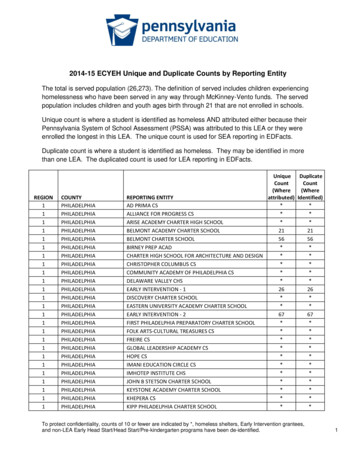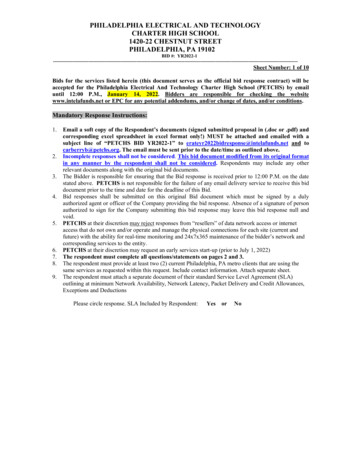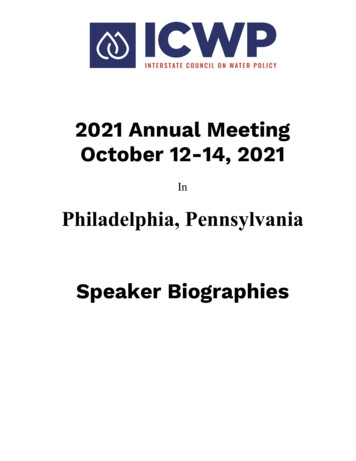
Transcription
2021 Annual MeetingOctober 12-14, 2021InPhiladelphia, PennsylvaniaSpeaker Biographies
Rebecca (Becci) Anderson — U.S. Geological Survey (USGS)Becci Anderson is the Hydrography Management and Planning Lead with the USGS National Geospatial Program,overseeing the management, planning, and communications for the National Hydrography Datasets. She is the chair ofthe National Hydrography Infrastructure Working Group and the co-lead of the FGDC NGDA Water-Inland Theme.Becci holds a Master of Science degree in Geography from Oregon State University, and has experience with nationaland international coordination, program management and planning for science programs, and technical expertise inGIS, cartography, data analysis, and database management.Geoff Bowman — Van Scoyoc Associates (VSA)Geoff Bowman is one of the nation’s leading policy experts on water resources and transportation infrastructurepolicy. Having spent 15 years as a Professional Staff Member on the US House of Representatives Committee onTransportation and Infrastructure, Geoff offers clients an insider’s perspective on the policy, players, and politicsinvolved in those issues. Before joining VSA in the summer of 2017, Geoff was the Staff Director of the HouseTransportation and Infrastructure Committee’s Water Resources and Environment Subcommittee, where heshepherded passage of the Water Infrastructure Improvements for the Nation (WIIN) Act of 2016 and otherenvironmental laws. Prior to that, he was instrumental in the passage of WRDA 2007 and WRRDA 2014. Geoff hasalso worked closely with the many federal agencies under the Committee’s jurisdiction, including the Army Corps ofEngineers (ACOE), the Environmental Protection Agency (EPA), the Tennessee Valley Authority (TVA), the NaturalResources Conservation Service (NRCS), the Saint Lawrence Seaway Development Corporation, the Federal MaritimeAdministration (MARAD), and other water resources, environmental, and maritime transportation agencies. Geoff’smore than two decades of water infrastructure and transportation infrastructure policy experience make him a valuableresource to coastal and inland ports and private sector entities looking to partner with the federal government. He hasexpertise in Rivers and Harbors Acts, Flood Control Acts, Water Resources Development Acts, the Clean Water Act,and various other environmental laws and statutes. Geoff is able to guide his clients through both the legislativeprocess and the bureaucracies at the ACOE, the EPA, the Department of Transportation, and other relevant federalagencies. Geoff spent his formative years in the House of Representatives working for Representative Walter Jones(NC-3). He resides with his wife, 2 young daughters, and 2 dogs in Annapolis, Maryland.Doug Burns, Ph.D. — U.S. Geological Survey (USGS)Doug is a Research Hydrologist with the U.S. Geological Survey (USGS) in Troy, NY. He holds a B.A. in Geologyfrom Hope College, an M.S. in Environmental Sciences from the Univ. of Virginia, and a Ph.D. in Water ResourcesManagement from the SUNY College of Environmental Science and Forestry. Currently, he serves in three roles (1)manager of the Atmospheric Monitoring program at USGS, (2) coordinator of integrated science and the NextGeneration Water Observing Systems USGS program in the Delaware River basin, and (3) Co-Chair of the upcomingNew York Climate Change Assessment. His research interests focus on the effects of human activities on waterquality, aquatic ecosystems, and hydrology. The environmental effects of atmospheric deposition of nitrogen, sulfur,mercury, and carbon remain among his strongest research interests. He has authored more than 135 papers and reportsthus far during his career.Marc Cammarata — Philadelphia Water Department (PWD)Marc Cammarata is the Deputy Water Commissioner for Planning & Environmental Services for the PhiladelphiaWater Department. His responsibilities include the integration, direction, and management of the Department’splanning initiatives and environmental programs focused on wet weather compliance, source water protection, greeninfrastructure implementation, facility and linear asset renewal and replacement, ecological restoration, laboratoryservices, energy, and climate mitigation and adaptation. He has over 23 years of experience in water resourcesengineering and environmental planning.
Julie Cunningham — Oklahoma Water Resources Board (OWRB)Julie Cunningham was appointed Executive Director of the Oklahoma Water Resources Board in March 2017 and hasserved the OWRB for over 22 years in its water quality, infrastructure financing, and water management programs. AsDirector, Ms. Cunningham oversees all aspects of the Oklahoma Comprehensive Water Plan, water rightsadministration, hazard mitigation and water quality monitoring programs, as well as the State’s multibillion-dollarwater infrastructure financing programs. She currently serves as chairman of Oklahoma’s Water for 2060 ProducedWater Working Group, commissioner on four interstate stream commissions, chair of the Interstate Council on WaterPolicy, vice president of the Association of Western State Engineers, and is the Oklahoma representative on theWestern States Water Council. Julie is an Oklahoma City native, an Oklahoma State University alumnus, and anoutdoor and travel enthusiast!Mindi Dalton — U.S. Geological Survey (USGS)Mindi Dalton is the Program Coordinator for the USGS Water Availability and Use Science Program (WAUSP).WAUSP works with partners and stakeholders to improve our understanding on increasing demand and competitionfor limited water resources to ensure adequate water availability for both human and ecological needs now and into thefuture through supporting research, model development, and assessments that advance the goal of improving ourunderstanding of water availability at the National and Regional level through the National Water Census (NWC). HerUSGS career began as a hydrologist at the Georgia Water Science Center and she still resides in Atlanta, GA with herhusband Brendan, son Patrick, and dogs Rosie and Pete.Andrew D. Dehoff, P.E. — Susquehanna River Basin Commission (SRBC)Andrew Dehoff was appointed Executive Director of SRBC in September 2013 following two three-year managementassignments at the Commission. First with the Planning and Operations program to oversee collection and analysis ofwater use data and more recently with the Project Review program. The latter work in the Commission’s regulatoryprogram entailed directing the review of proposed water withdrawals and the consumptive use of water by industries,public water suppliers, power generation facilities, and the natural gas industry. Prior to holding managementpositions, Andrew provided twelve years of Commission service as a water resources engineer involved in manyaspects of water resources management, including water availability and safe yield analyses, reservoir operations, anddrought and flood management. He holds a B.S. and M.E. in Civil Engineering from the University of Virginia and isa licensed professional engineer in Pennsylvania since 2001.Steven Domber — New Jersey Department of Environmental Protection (NJ DEP)Steve is the Section Chief of the Water Supply Modeling and Planning group at the New Jersey Geological and WaterSurvey, which is part of the New Jersey Department of Environmental Protection. He has two Masters of Sciencedegrees from the University of Wisconsin Madison: one in Geology and one in Water Resource Management, and aBachelor of Science in Geoscience from Hobart College. He has been with the NJ DEP since 2000 and has worked ona host of water related permitting, litigation, and research topics. His work includes aquifer test analyses, water usedata, water supply planning, water resource availability research, drought monitoring, river and reservoir modeling,wetlands, hydrology, and the identification and classification of springs in New Jersey. Since 2010, Steve has beenworking with section staff to expand the state’s ability to model and evaluate surface water reservoir safe yield,improved operations, drought, and risk evaluation using the RiverWare software in New Jersey and the Delaware andHudson basins.Dr. Jessica Driscoll — U.S. Geological Survey (USGS)Dr. Jessica Driscoll is a Hydrologist at the USGS with the Integrated Modeling and Prediction Division and currentlyserving as the Drought Science Program Manager from the Denver Federal Center in Colorado. Her researchbackground includes work on national hydrologic model development and impacts of water management decisions onwater availability. Dr. Driscoll earned her Ph.D. in hydrology from The University of Arizona, Tucson, AZ where she
also received her B.A. in hydrology. She graduated cum laude from Amherst College, Amherst, MA with her B.A. ingeology.Jim Duncker — U.S. Geological Survey (USGS), Central Midwest Water Science CenterBorn and raised on the south side of Chicago. Jim received his Bachelor’s degree in Geology from the University ofColorado in 1982. In 1983 while in graduate school at Northern Illinois University, he began working for the USGS.His career with USGS has spanned a wide range of hydrologic and multi-disciplinary studies, including developingtechniques and methods for hydroacoustic flow measurements in the Chicago Area Waterway, monitoringeffectiveness of green infrastructure, and watershed modeling.In 2012 Jim began working on multidisciplinary projects related to keeping invasive bigheaded carp out of the GreatLakes. This work has examined links between water quality and the apparent stalling of the bigheaded carp populationfront in the lower Des Plaines River. In 2021 Jim became the Illinois River Basin Coordinator when the Illinois RiverBasin was selected as the 3rd Integrated Water Science basin.Brian Ebel, Ph.D. — U.S. Geological Survey (USGS)Dr. Brian Ebel is a research hydrologist at the U.S. Geological Survey within the Water Resources Mission Area. Hiswork addresses landscape disturbance impacts on water availability and water-related hazards to human lives andinfrastructure. Brian is managing a new Water Mission Area project focused on assessment and prediction of wateravailability changes after wildfire in the western U.S. with an emphasis on water quality. He earned his Ph.D. inHydrogeology from Stanford University, Stanford, CA, and his B.A. in Earth and Planetary Sciences from WashingtonUniversity in St. Louis, St. Louis, MO.Dr. Thomas Graziano — U.S. National Weather Service (NWS)Dr. Thomas Graziano is the Director of the U.S. National Weather Service (NWS) Office of Water Prediction (OWP),a geographically distributed organization that includes elements in Maryland, Minnesota and Alabama. The OWPcollaboratively researches, develops and delivers state-of-the-science national hydrologic analyses, forecastinformation, data, decision-support services and guidance to support and inform essential emergency services andwater management decisions nationwide.Tom has held numerous leadership roles over more than 35 years of federal service, most recently serving as the Chiefof Staff for the NWS, from November 2013 to January 2016. From 2000 to 2013, Tom worked in hydrologic services,most notably as the Chief of the Hydrologic Services Division at NWS Headquarters.Tom was awarded a Department of Commerce (DOC) Bronze Medal in 2003 for work on flash flood decisionassistance, a DOC Bronze Medal in 2001 and a NOAA Administrator’s Award in 1999 for his work on the quantitativeprecipitation forecasting process, the DOC Energy and Environmental Stewardship in 2015 as part of the team thatdesigned and oversaw construction of the National Water Center in Tuscaloosa, Alabama, and a DOC Gold Medal in2017 as part of the team that implemented the new U.S. National Water Model.In addition to earning his Ph.D. in Atmospheric Science from North Carolina State University (1995), Tom earned aMaster of Science degree in Meteorology from Penn State University (1985) and a Bachelor of Science degree inMeteorology from Northern Illinois University (1981).Amy M. Guise — U.S. Army Corps of Engineers (USACE)Ms. Amy Guise became the Chief, Planning Division, for the Baltimore District, U.S. Army Corps of Engineers, in2012. She leads a team of 55 interdisciplinary professionals addressing water resources issues and policies in thePotomac and Susquehanna River Basins, the Chesapeake Bay, and the Atlantic Coast of Maryland. She is theAlternate Federal Commissioner to the Susquehanna River Basin Commission and the Interstate Commission on thePotomac River Basin. Partners and customers range from Department of Defense installations and other federalagencies to states, non-governmental organizations and private entities.
Particular focus areas for the Baltimore District Planning Division include:* Risk and vulnerability analyses, including the North Atlantic Coast Comprehensive Study* Watershed and comprehensive planning* Water resources planning for military installations* Public-Private Partnerships* Best Management Practice and Total Maximum Daily Load analyses* Environmental compliance* Ecosystem restoration* Geographic Information System and database support* Chesapeake Bay restoration and River Basin Commission partnerships* Flood risk management, analyses and mapping* Planning Center of Expertise - Coastal Storm Damage Reduction, National Hurricane Program* Post-Katrina 100-year flood protection, and set up of Louisiana Water Resources CouncilMs. Guise was born and raised in rural Pennsylvania and has a Bachelor of Science in Ecology and Water Chemistryfrom Juniata College, a Master of Science in Environmental Science and Policy from Johns Hopkins University.Peter Johnson — Great Lakes St. Lawrence Governors & PremiersPeter Johnson serves as the Deputy Director of the Great Lakes St. Lawrence Governors & Premiers. The organizationunites eight U.S. Governors and two Canadian Premiers working together to grow the region’s 6 trillion economy andprotect its world-class environment.Peter helped facilitate the negotiation and served as primary draftsman of the “Great Lakes Compact” and thecompanion cross-border Agreement--historic agreements and legislation that allow the eight U.S. Great Lakes States,Ontario and Québec to cooperatively manage water use in the Great Lakes-St. Lawrence Basin. He now serves as theSecretary to the Governors’ Compact Council and serves as primary staff support to both organizations.He has a B.A. in Political Science from North Park University, a J.D. from Boston College Law School, and has been amember of the Illinois Bar since 1991.Adão Henrique Matonse, Ph.D. — New York City Department of Environmental Protection (NYC DEP)Dr. Adão Matonse is the Deputy-Chief, Operations Modeling and Analysis (OM&A) in the Executive Directorate, NewYork City (NYC) DEP - Bureau of Water Supply (BWS). Throughout his 20 year’s career in hydrology and waterresources engineering, Dr. Matonse has played roles in the industry, academia, research and management. In his currentposition he helped create and leads the OM&A team that maintains and applies NYC DEP’s Operations Support Tool(OST) to support both, water supply operations, planning and climate change impact assessment. He is a regularparticipant in the Delaware River Basin Decree Parties Work Group. Adão holds a Master and Ph.D. degrees from theEnvironmental Resources Engineering (ERE) Department of the State University of New York (SUNY) College ofEnvironmental Sciences and Forestry (ESF) in Syracuse, NY.Samantha Oliver, Ph.D. — U.S. Geological Survey (USGS)Samantha Oliver is a data scientist at the U.S. Geological Survey and is located in Madison, Wisconsin, where shemanages a water temperature modeling project, with the goal of combining process-based and machine learningmodels in order to improve the accuracy of water temperature forecasts to support real-time decision making. She hasalso recently contributed to a variety of other water quality projects, including long-term trends in stream waterquality, the biological relevance of contaminants in Great Lakes tributaries, and the effects of best managementpractices on runoff from farm fields. Prior to joining the USGS, Samantha received her Ph.D. in Freshwater andMarine Sciences from the University of Wisconsin-Madison, Madison, WI where she did continental-scale waterquality research.
Jaime Painter — U.S. Geological Survey (USGS)Jaime Painter has been with the USGS for over 21 years primarily employing geospatial analytics toward national,regional, and local topics of water availability and use. She has a Bachelor’s and a Master’s of Science in geography.Relating known water use quantities with the hydrologic processes and socio-economic drivers behind the decision touse the water is critical for informed water-use estimates and predictions and key for projecting future water demand.Jaime currently serves as the USGS Water Mission Area Water Use Program Manager. In this role she collaborativelyestablishes strategic plans that aim to enhance USGS capability to report comprehensive and reliable water-use atmultiple spatial and temporal scales for all states and territories.Dovarius Peoples — U.S. Army Corps of Engineers (USACE)Dovarius L. Peoples is the Chief Information Officer for the U.S. Army Corps of Engineers (ACOE). Dovarius wasselected for the Senior Executive Service in July 2018. He assumed the position of the Chief Information Officer/G-6(CIO/G-6) at the US Army Corps of Engineers on 28 April 2019. In this role, he serves as the principal advisor to theCorps Commanding General on information technology issues. He is responsible for all aspects of informationresource management and information technology for the Corps.Dr. Cherie Schultz — Interstate Commission on the Potomac River Basin (ICPRB)Cherie Schultz, Ph.D. is Director of Operations for the Section for Cooperative Water Supply Operations on thePotomac (CO-OP) at the Interstate Commission on the Potomac River Basin (ICPRB). ICPRB’s CO- OP Sectionprovides support to the Washington metropolitan area’s regional water supply system, which includes suppliers inMaryland, Virginia, and the District of Columbia. Dr. Schultz is responsible for water demand and availabilityforecasts for the region, conducted every five years, which include estimates of the impact of upstream consumptiveuse on Potomac River flows and the potential impact of climate change on future supplies. She is also responsible formanagement of metropolitan area water supplies and operations during periods of drought. Recent projects includedevelopment of a real-time Low Flow Forecast System to help inform reservoir release decisions an evaluation of therelative abilities of proposed structural and operational water supply alternatives to meet future challenges. Dr. Schultzholds a bachelor’s degree in physics from Stanford University, a doctoral degree in physics from the State Universityof New York at Stony Brook, and a master’s degree in civil engineering from the University of Maryland.Amy Shallcross — Delaware River Basin Commission (DRBC)Amy Shallcross has more than 20 years of experience as a hydraulic, hydrologic and water quality modeler for theassessment and support of reservoir operations, storm water management, combined sewer overflow controls, andwaste load allocation studies. Previously, she worked in the watershed protection unit of the New Jersey Water SupplyAuthority as a water resources engineer and watershed management planner. Amy is a licensed professional engineerin New Jersey with a Bachelor’s and Master’s of Science in Civil and Water Resources Engineering from TuftsUniversity. Amy is currently the ICWP Water Data, Science and Planning Committee Chair and is employed by theDelaware River Basin Commission, Supervisor of Operations, Water Resources Management Branch.Sachin Shah — U.S. Geological Survey (USGS)Sachin Shah has over 19 years of hydrology, socioeconomics, and international development experience. Sachinstarted his career with the USGS in 2000 through 2009. From 2009-2015, he led programs for the World Bankfocused on water stress, socioeconomics, and vulnerabilities to communities in South Asia. He was also an economicdevelopment fellow with Council of Energy-Environment-Water and worked on the UN-Shell Water-Energy NexusInitiative. He currently serves as the USGS Water Mission Area Socioeconomic Drivers Program Manager. He has aBS/MS in Hydrogeology and Masters in International Development-Social Policy from the UT-Austin LBJ School ofPublic Affairs.
Megan Shoda — U.S. Geological Survey (USGS)Meg Shoda is a hydrologist with the USGS and the project manager for the Integrated Water Availability Assessmentin the Delaware River Basin. Her research interests include water-quality status and trends, organic contaminants,bioassessment, and data workflow management.Michael Thompson — Delaware River Basin Commission (DRBC)Michael Thompson joined the Delaware River Basin Commission in 2018, working in the Water Resource PlanningSection as a Water Resource Engineer. Prior to DRBC, he worked as a staff engineer for a global design andconsultancy firm. Michael holds a Bachelor of Science in Civil Engineering from Lafayette College, and a Master ofScience in Civil Engineering from the University of Notre Dame. He is a licensed professional engineer in theCommonwealth of Pennsylvania.Chad Wagner — U.S Geological Survey (USGS)Chad is the Program Coordinator of the U.S. Geological Survey, Groundwater and Streamflow Information Program(GWSIP). He has been with the USGS since 2000 as a project chief and in various leadership positions, all of whichhave allowed him to gain a strong understanding and appreciation for the way USGS collects, processes and deliversstreamflow and groundwater information. Chad recently moved into the GWSIP Coordinator role from his position asthe Associate Director of the USGS South Atlantic Water Science Center (North Carolina-South Carolina-Georgia),where he provided leadership over a very diverse group of scientists that conduct data collection andresearch/investigations related to topics such as hydraulic, hydrologic and groundwater modeling, tracking themovement of groundwater contamination, water-availability for human and ecological uses, and groundwater andsurface-water quality related to anthropogenic and agricultural activities.Since 2010, Chad has been involved in USGS Storm Tide Monitoring efforts - from field deployments to teamcoordination and working with FEMA on mission assignments. From his early days with the USGS, Chad has alsobeen heavily involved in hydro acoustics and has helped shape the USGS advancements in streamflow measurementtechniques since the mid 2000's. Chad holds a Bachelor and Master of Science degrees in Civil/EnvironmentalEngineering from the University of Tennessee and is a licensed Professional Engineer.Kirsten Wallace — Upper Mississippi River Basin Association (UMRBA)Kirsten Wallace was appointed Executive Director for the Upper Mississippi River Basin Association (UMRBA) in2018. The Association is a 5-state interstate organization formed by the Governors of Illinois, Iowa, Minnesota,Missouri, and Wisconsin to coordinate the states’ river-related programs and policies and work with federal agenciesthat have river responsibilities. In her position, Kirsten develops regional positions, advocates the states’ collectiveinterests before Congress and the federal agencies, and facilitates and fosters interagency coordination, cooperation,and communication. Prior to her role as Executive Director, Kirsten served as UMRBA’s Ecosystem and NavigationProgram Director for ten years.Kirsten received a master’s in public Affairs degree and a Master in Environmental Science degree from IndianaUniversity-Bloomington, concentrating in policy analysis, public finance administration, and water resources. Kirstenreceived a B.A. in Political Science, with a minor in Economics, from Gustavus Adolphus College in St. Peter,Minnesota.Jill Whitcomb — Pennsylvania Department of Environmental Protection (PA DEP)Since September 2019, Jill Whitcomb has been the Director of the Pennsylvania Department of EnvironmentalProtection (DEP) Chesapeake Bay Office, where she provides oversight, leadership, and support of Pennsylvania’sChesapeake Bay Watershed restoration efforts. Prior to serving in this role, she was the Environmental GroupManager for the Nonpoint Source Compliance Section in the DEP Bureau of Clean Water, where she provided
statewide oversight of compliance, inspection, and enforcement of state and federal requirements for agriculture andstormwater. In her current role, she continues to manage statewide agriculture compliance, inspection, andenforcement, to include the Chesapeake Bay Agriculture Inspection Program, and oversees the joint administration ofthe Nutrient Management Program with the State Conservation Commission. She also oversees the statewideConservation District Support Section, which provides liaison support and assistance to conservation districts, and thestatewide Watershed Support Section, which administers EPA’s Section 319 Nonpoint Source Management andPennsylvania’s Growing Greener grants programs. She has worked in other capacities within DEP and has representedDEP on the Chesapeake Bay Program Partnership’s Wetlands Workgroup, Urban Stormwater Workgroup, andAgriculture Workgroup. Before joining DEP, Jill worked for the Lancaster County Conservation District as a GrantsCoordinator and Agriculture Conservation Technician. Jill holds a Master of Environmental Pollution Control fromPenn State University and a Bachelor of Science in Biology from Lebanon Valley College.
Resources Conservation Service (NRCS), the Saint Lawrence Seaway Development Corporation, the Federal Maritime Administration (MARAD), and other water resources, environmental, and maritime transportation agencies. Geoff's more than two decades of water infrastructure and transportation infrastructure policy experience make him a valuable
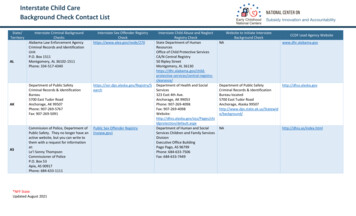
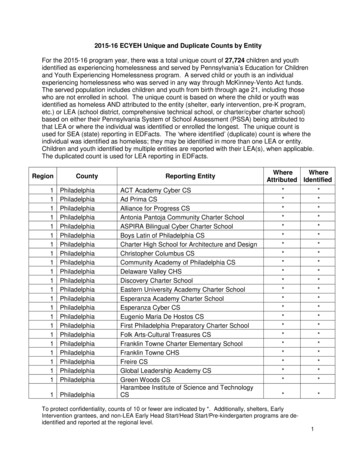
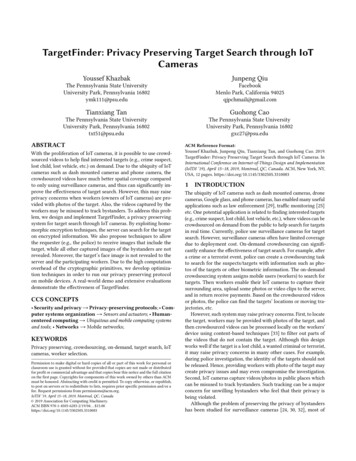




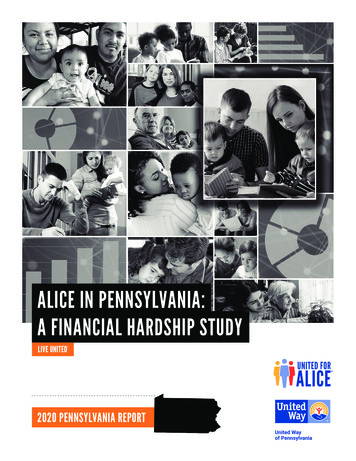
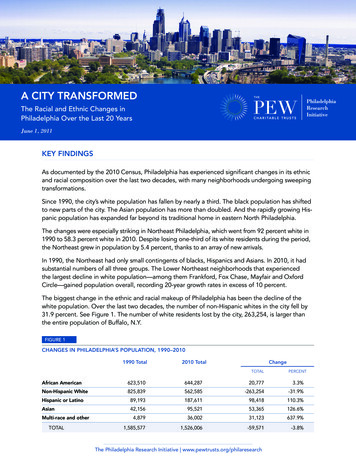
![Prekindergarten Head Start Application [Initial Screening]](/img/43/head-start-application.jpg)
